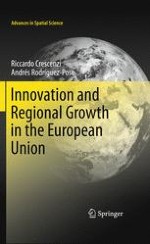2011 | OriginalPaper | Buchkapitel
4. The Role of Underlying Socio-Economic Conditions
verfasst von : Riccardo Crescenzi, Andrés Rodríguez-Pose
Erschienen in: Innovation and Regional Growth in the European Union
Verlag: Springer Berlin Heidelberg
Aktivieren Sie unsere intelligente Suche, um passende Fachinhalte oder Patente zu finden.
Wählen Sie Textabschnitte aus um mit Künstlicher Intelligenz passenden Patente zu finden. powered by
Markieren Sie Textabschnitte, um KI-gestützt weitere passende Inhalte zu finden. powered by
